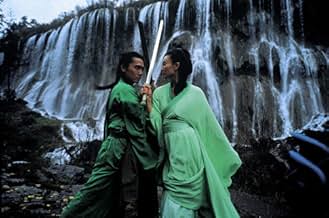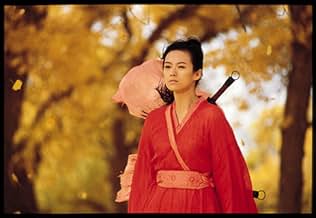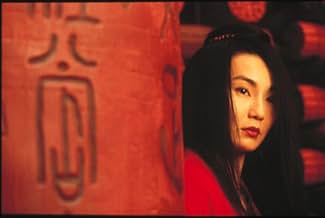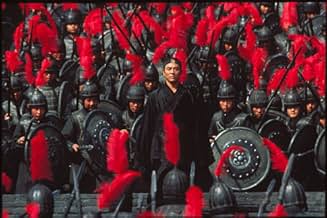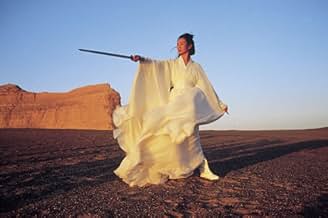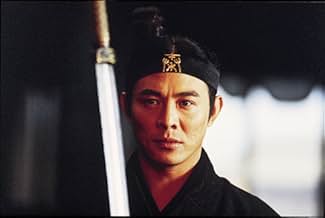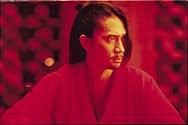A defense officer, Nameless, was summoned by the King of Qin regarding his success of terminating three warriors.A defense officer, Nameless, was summoned by the King of Qin regarding his success of terminating three warriors.A defense officer, Nameless, was summoned by the King of Qin regarding his success of terminating three warriors.
- Nominated for 1 Oscar
- 46 wins & 48 nominations total
- Broken Sword
- (as Tony Leung Chiu-Wai)
- Flying Snow
- (as Maggie Cheung Man-Yuk)
- Moon
- (as Zhang Ziyi)
- King
- (as Chen Dao Ming)
- Scholar
- (as Liu Zhong Yuan)
- Old Servant
- (as Zheng Tian Yong)
- Commander
- (as Zhang Ya Kun)
- Seven Qin Guards
- (as Hei Zi)
- Director
- Writers
- All cast & crew
- Production, box office & more at IMDbPro
Storyline
Did you know
- TriviaThe "red fight" between Moon and Flying-Snow was filmed in a forest in Mongolia. Director Yimou Zhang had to wait until the leaves turn yellow, and hired local nomads to gather even more yellow leaves in order to cover the ground completely. In fact, he was so fanatic about the leaves, that he had his crew separate the leaves into four different "classes" which were each put at increasingly farther lengths from the camera.
- GoofsAt the beginning of the movie, subtitles state that China was divided into seven warring states. At the end, the subtitles then state that "the King of Qin" unified China, without specifying which one. Historically, the king that was the one to unite all of the Chinese states was Ying Zheng (later changed name to Shi Huang Di) who inherited the throne from his deceased father at age 13 (as opposed to the age of the king in the movie). At the time, Ying Zheng began to rule China, the seven states were already reduced to two larger states (Qin and Chu) which was later dominated by Qin when Ying Zheng was 22 years old. It is therefore impossible for the same king shown in the movie to be the king that united all the Chinese states, although the end-note is semantically correct.
- Quotes
King of Qin: I have just come to a realization! This scroll by Broken Sword contains no secrets of his swordsmanship. What this reveals is his highest ideal. In the first state, man and sword become one and each other. Here, even a blade of grass can be used as a lethal weapon. In the next stage, the sword resides not in the hand but in the heart. Even without a weapon, the warrior can slay his enemy from a hundred paces. But the ultimate ideal is when the sword disappears altogether. The warrior embraces all around him. The desire to kill no longer exists. Only peace remains.
- Alternate versionsThe Director's Cut was 107:15 minutes, compared to the theatrical version at 96:23 minutes.
- ConnectionsEdited into Ying xiong: Cause - The Birth of Hero (2002)
First of all, I noticed heavy use of Daoist symbols. The five elements were used - one per fight - fire, wind, water, wood, and metal. A message in the film seemed to show the Daoist idea that the harder you try, the worse you do, as Moon did in her fights. On the other hand, if you can go with the Dao (think: Use the force, Luke), you will succeed.
Second, I did not know before watching the film that it was Zhang Yimou's. His films are often critical of the Chinese Communist Party and sometimes have deep allegorical meaning. Some of his films are banned in China. Hero, on the other hand, seemed to be intensely nationalistic. Lately in China, the communist government has promoted nationalism (instead of populist Communist values as they did pre-1976) with a great degree of success. The use of the word "Tianxia" (literally "all under heaven," translated in the movie was "Our Land") seems Confucian and nationalistic at the same time. Although I would have not guessed this film was by Zhang Yimou from the plot or message, the cinematography was unmistakable. Hero eerily reminded me of another film, Yellow Earth (Huang Tudi), which Zhang Yimou did not direct but for which he did the cinematography.
Third, historically, Hero lacked in a few very obvious places. The Qin Emperor, Qin Shi Huang, was legendary for his fear of death and his Machiavellian rule. When his character states that he no longer fears death because of Broken Sword's words and invites Nameless to kill him, he is entirely breaking with the true historical figure of the emperor. Remember, this is the emperor who built an entire terracotta army to protect him from his enemies in death and spent a lot of money and effort looking for the secret to reach immortality. He was known for a Confucian philosophy spin-off known as Legalism, which is very similar to Western Machiavellianism. While his quick mind (or his advisor's) might have figured out Nameless's plot, he would never have hesitated in executing him.
Overall, this seems like a break from the usual genre one would expect from Zhang Yimou. I am not sure exactly what message he is trying to convey with this film, other than an endorsement of Chinese nationalism and perhaps Daoism as well.
Details
Box office
- Budget
- $31,000,000 (estimated)
- Gross US & Canada
- $53,710,019
- Opening weekend US & Canada
- $17,800,000
- Aug 29, 2004
- Gross worldwide
- $177,395,557
- Runtime2 hours
- Color
- Sound mix
- Aspect ratio
- 2.35 : 1
Contribute to this page





